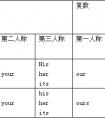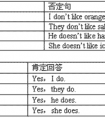水是眼波横,山是眉峰聚。欲问行人去那边?眉眼盈盈处。才始送春归,又送君归去。若到江南赶上春,千万和春住。
用所给动词的 适当形式填空。1. I'm sorry ______ (say) that there's nothing ______ (eat).2. This afternoon the biggest football match of this year ______ (be)-九年级英语
Shall we have a rest or get down to doing our work? 我们休息呢还是开始干活?
3.作形容词的宾语
The music is well worth listening to more than once. 这种曲子很值得多听几遍。
We are busy preparing for the coming sports meet. 我们正为马上到来的运动会忙着做准备。
三、动名词作表语
动名词作表语时句子主语常是表示无生命的事物的名词或what引导的名词性从句。
表语、动名词与主语通常是对等的关系,表示主语的内容,主语、表语可互换位置。
Your task is cleaning the windows. 你的任务就是擦窗户。
(Cleaning the windows is your task.)
What I hate most is being laughed at. 我最痛恨的就是被别人嘲笑。
(Being laughed at is what I hate most.)
四、动名词作定语
动名词作定语往往表示被修饰词的某种用途。如:
a walking stick =a stick for walking=a stick which is used for walking
a washing machine=a machine for washing=a machine which is used for washing
a reading room=a room for reading=a room which is used for reading
a measuring tape=a tape for measuring=a tape which is used for measuring
sleeping pills=pills for sleeping=pills which is used for sleeping
动名词也有时态和语态的变化,如表所示(以及物动词write为例),不及物动词没有语态的变化。
| 时态、语态 | 主动 | 被动 |
| 一般式 | writing | being written |
| 完成式 having written |
having been written |
1) 动名词做主语时,谓语动词为单数
2) 在动名词和不定式中,作为介词的宾语是动名词
3) 动名词的否定直接在其前加否定词,通过代词的宾格或所有格形式给出逻辑主语
例:I would appreciate you calling back this afternoon.
4) 有些词后只能接动名词
acknowledge;admit; advise;advocate;allow;appreciate; avoid; celebrate; consider; contemplate; defer; delay; deny;
detest; discontinue; dislike; dispute; enjoy; it entails; escape; excuse; explain; fancy; feel like; finish; forgive; can’t help;
hinder; imagine; it involves; keep; it means; mention; mind; miss; it necessitates; pardon; postpone; practice; prevent;
recall; report; resent; resist; risk; suggest; understand...
5) 另外还有一些接-ing形式的常用说法
it’s no good; it’s no/little/hardly any/ use; it’s not/hardly/scarcely use; it’s worthwhile; spend money/time; there’s no;
there’s no point in; there’s nothing worse than; what’s the use/point
6) 有些词后面加不定式和动名词均可
remember,forget,try,stop,go on,continue,stop,regret,cease,mean后面均可用不定式和-ing形式,但意义截然不容。
例:remember to do/doing:
①I remembered to post the letters.(指未来/过去未来将要做的动作)
②I remembered posting/having posted the letters.(我记得做过这个动作)
forget与remember的用法类似。
regret的用法:
①I regret to inform you that…(我很遗憾地通知你……)
②I regretted having left the firm after twenty years.(为了“二十年前的离开”而遗憾。)
try to(努力)与try +–ing(试验):
①You really must try to overcome your shyness.
②Try practicing five hours a day.
考点名称:一般过去时
- 一般过去时:
表示过去某个时间里发生的动作或状态;过去习惯性、经常性的动作、行为;过去主语所具备的能力和性格。
基本结构:
主语+动词过去式+其他;
否定形式①was/were+not;②在行为动词前加didn't,同时还原行为动词;
一般疑问句Did+主语+do+其他。 - 一般过去时句法结构:
肯定形式
主语+动词过去式+其他
例句:She often came to help us in those days.
否定形式
①was/were+not;②在行为动词前加didn't,同时还原行为动词
例句:I didn't know you like coffee
一般疑问句
①Did+主语+do+其他? ②Was\Were+主语+表语?
例句:Did I do that?
用表格整理如下:
记忆口诀:肯定式 疑问式 否定式 疑问否定式 Iworked Did I work? I did not work Did I not work? He(She,It) worked Did he(she,it) work? He(she,it) did not work Did he(she,it) notwork? We worked Did we work? We did not work Did we not work? You worked Did you work? You did not work Did you not work? They worked Did they work? They did not work Did they not work?
一般过去时并不难,过去动作、状态记心间。
动词要用过去式,时间状语句末站。
否定句很简单,didn't 站在动原前,其它部分不要变。
一般疑问句也好变,did放在句子前,主语、动原、其它部分依次站。
特殊疑问句也简单,疑问词加一般疑问句记心间。
最后一条请注意,动词过去式要牢记!
一般过去时中动词过去式变化规则:
词
构成
举例
一般情况
词尾+ed
动词原形
过去式和过去分词
look
talklooked
talked以不发音字母e结尾
词尾+d
like
arriveliked
arrived以“辅以字母+y”结尾
变y为i,再加ed
fly
studyflied
studied以重读闭音节结尾,且末尾只有一个辅音字母
双写词尾+ed
stop
planstopped
planned
结构句型:
1.一般句子
I watched TV last night.
2.一般疑问句
Did you watch TV last night?
3.there be 句型
There was an apple on the table last night.
Was there an apple on the table last night - 一般过去时注意事项:
1.注意主句与从句中时态的一致性
如果主句用了过去时,从句中一般也要用过去式,或者过去进行时、过去完成时等。例如:
He believed that he was right. 他相信自己是对的。
I didn’t know you were here. 我不知道你在这儿。
I thought they were with you. 我以为他们和你在一起。
2.在口语中, 一般过去时并不一定指真正的过去,而只是表示一种礼貌性语气。例如:
I wondered (wonder) if you could do me a favor. 不知你可否帮我一个忙。
I wanted (want) to ask if I could borrow your car. 我想问问可否借用你的车。
I hoped (hope) you could (can) give me some advice. 我希望你能帮我出点主意。
Did (Do) you want to see me? 你想见我吗?
3.used to
used to 是一个词组,表示“过去曾经是……而现在已经停止了”的动作。例如:
I used to work fourteen hours a day. 我过去常常一天干十四个小时。(而现在不这样了)
I used to take a walk in the morning.我过去是在早晨散步。(而现在不在早晨散步了)
- 最新内容
- 相关内容
- 网友推荐
- 图文推荐
上一篇:It's time for us ______ lunch. Let's go.[ ]A. for haveB. to haveC. haveD. to-九年级英语
下一篇:—What do you mean?—I hope .[ ]A. my mother to come back earlier from work todayB. to hear from her as soon as possibleC. not bother you by talking about my -九年级英语
零零教育社区:论坛热帖子
| [家长教育] 孩子为什么会和父母感情疏离? (2019-07-14) |
| [教师分享] 给远方姐姐的一封信 (2018-11-07) |
| [教师分享] 伸缩门 (2018-11-07) |
| [教师分享] 回家乡 (2018-11-07) |
| [教师分享] 是风味也是人间 (2018-11-07) |
| [教师分享] 一句格言的启示 (2018-11-07) |
| [教师分享] 无规矩不成方圆 (2018-11-07) |
| [教师分享] 第十届全国教育名家论坛有感(二) (2018-11-07) |
| [教师分享] 贪玩的小狗 (2018-11-07) |
| [教师分享] 未命名文章 (2018-11-07) |


![Sunday is my birthday. I would like _____ a birthday party, would you _____to my party? [ ]A. have; come B. to have; to come C. have; to come D. to have-七年级英语](http://www.00-edu.com/d/file/ks/4/2/budingshi/2020-01-08/smalla85122db0c71d7fb6ae58187be7f1fd11578430330.png)

![Why areyou here? You are supposed ______ in the classroom now. [ ] A. to studyB. to be studiedC. studying D. to be studying -九年级英语](http://www.00-edu.com/d/file/ks/4/2/budingshi/2020-01-08/small6dee02daa62cac1c71853ac804ab4fbd1578422460.png)
![She is very poor. Little food _____ and no room _____! [ ]A. to eat, to live B. to eat, to live in C. eating, living -八年级英语](http://www.00-edu.com/d/file/ks/4/2/budingshi/2020-01-09/small17b77c2697a3ef8f1461d0d14b016ee51578585185.png)


